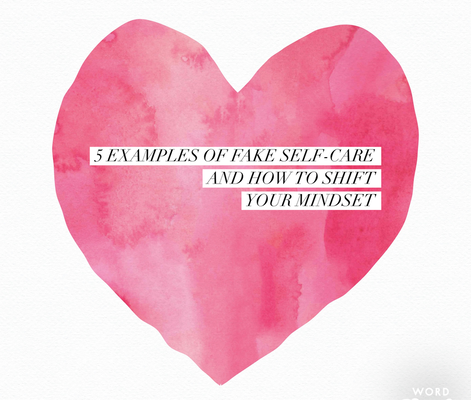|
Self-care. What is it exactly? Those two words permeate today’s society. It has become a movement. How would you define it in a sentence? The simplest definition is “to care for oneself.” How exactly does one care for oneself though? We all have our own versions of self-care. I am going to provide five examples of what we might think are self-care, but upon further examination, are the furthest from self-care. Let’s dig in. 1. Dieting
We might think starting a diet or changing our eating habits is the perfect way to engage in self-care. Of course it is essential to evaluate our nutrition and limit foods that are processed and high in sugar. A diet can mean an entirely different thing from one person to another. The word diet inherently implies restriction which can lead to feelings of deprivation and end in indulgence. Self-care around nutrition really involves a shift in mindset from food as a reward or de-stressor to nourishment and a source of energy. Whether you are a vegetarian, vegan, pescatarian, flexitarian or anything else, it’s about moderation, as little processing as possible, and balance. Ditch the diet and commence a long-term journey of quality over quantity. 2. Yes Everyone is asking us to participate on a board, help with a project, join a new club, lead an activity, the list is endless. While it might be an honor (and it is congrats!), it is also ok to say no or say check back in a few months. People will respect you for knowing your limitations and not over-committing yourself to the point where you are unable to fulfill whatever they have requested of you. “No” is a form of self-care and it is ok to say so. It is your life, your time, your energy and your passion. Use it wisely and harness your energy for what is deeply important to you. 3. Indulgence Self-care is staying in and indulging on chocolate cake while watching Netflix right? Only to wake up the next day (well probably more like in the middle of the night from consuming so much sugar) not feeling well. It may feel good in the moment, but true self-care is what will make you feel good the next day and the next. Seek new ways of indulgence such as a bath, time with a good book, tea with a friend or that nearby park you’ve been meaning to explore. Indulgence comes in many forms -- seek those that bring you energy in both the short and long-term. 4. Escape Society often makes us think escape is a form of self-care. Escape from politics, escape from colleagues, escape from commitments. True self-care is taking an active role in life and not hiding in a corner thinking society will figure itself out with you, work will be fine without you, commitments are just casual, and people don’t value your input. If someone invites you into a room, you are meant to be heard. Take a stance, share your opinions, interact with others in meaningful conversation. Are you building a life you need to escape or one you don’t want to escape from? That question drove my decision to move back to Maine. I realized after nine years in Boston (I love Boston!), that I craved easier access to the outdoors. It is ok to acknowledge what your heart needs and run straight for what is pulling at it. That magnetism is there for a reason. Follow it. 5. Seeking loopholes Do you ever find yourself making an excuse for not engaging in positive behavior towards caring for yourself? Author and habit-formation guru Gretchen Rubin calls this loophole-spotting and rejection. The first part involves identification of the loophole and the second involves the rejection of it to stay on a positive track. She identifies 10 kinds of loopholes to identify and reject including the “tomorrow loophole” (aka you assume you will do it tomorrow), the “lack of control loophole” (aka I can’t help myself), the “false choice loophole” (aka I am busy doing this, so I can’t do that) and the “this doesn’t count loophole” (aka making an excuse because of illness, time of the week, etc). While it is absolutely ok to give yourself a break from time to time, there is a fine line between the once and awhile break and making it a regular habit. When your occasional break becomes a daily habit, it is no longer a break. In turn, the level of joy your break brings you will decrease over time because you experience it so frequently. Remember, quality over quantity. Make sure those occasional breaks are just that, occasional. In summary, self-care is about identifying energy sources vs. uses. Self-care is leaning into where you derive energy, strength, joy and passion. Identify and reject those things, foods, people and habits that drain your energy and joy. As always, if you’d like a partner in your journey, I am here to help and am just a note or DM away. Stay tuned for next month’s blog post where we will dive even deeper into this subject.
0 Comments
Your comment will be posted after it is approved.
Leave a Reply. |
AuthorCaitlin Crowe is a certified health coach, lover of nature, and creative soul. Archives
June 2019
Categories |

 RSS Feed
RSS Feed
